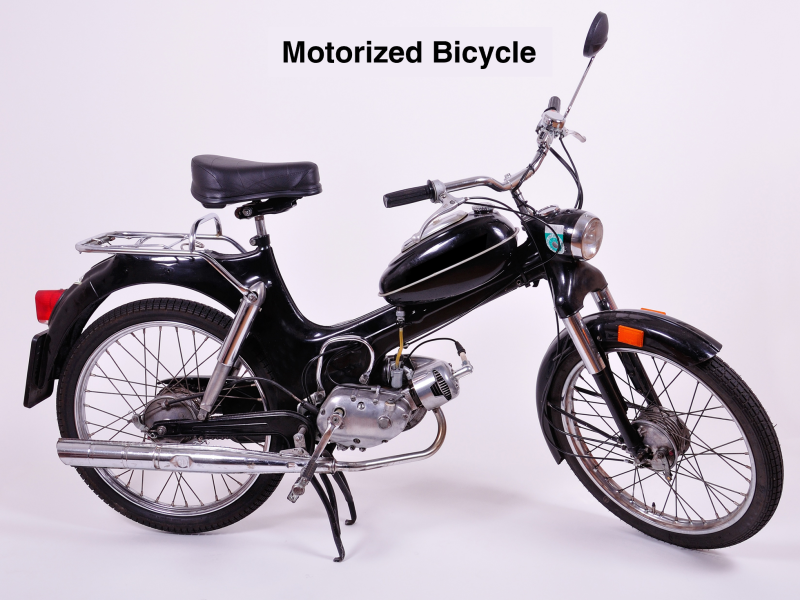Motor vehicles are defined as vehicles propelled by an internal-combustion engine, electricity or steam. All traffic laws apply to motor vehicles, motorized bicycles and other types of non-traditional vehicles except as identified in the applicable DC Code statute or regulation.
Types of non-traditional vehicles
 A motor-driven cycle has a seat or saddle and two or three wheels in contact with the ground and a gas, electric, or hybrid motor with a maximum piston or rotor displacement of 50 cubic centimeters, or its equivalent, with a maximum speed of 30 MPH (miles per hour).
A motor-driven cycle has a seat or saddle and two or three wheels in contact with the ground and a gas, electric, or hybrid motor with a maximum piston or rotor displacement of 50 cubic centimeters, or its equivalent, with a maximum speed of 30 MPH (miles per hour).
 A motorized bicycle has a post-mounted seat or saddle for each person; two or three wheels (at least 16 inches in diameter) in contact with the ground; fully operative pedals for human propulsion; and a motor capable of a maximum speed of 20 MPH on level ground.
A motorized bicycle has a post-mounted seat or saddle for each person; two or three wheels (at least 16 inches in diameter) in contact with the ground; fully operative pedals for human propulsion; and a motor capable of a maximum speed of 20 MPH on level ground.
 A motorcycle has a seat or saddle and two or three wheels in contact with the ground, is not a motor-driven cycle or motorized bicycle and can go over 30 MPH.
A motorcycle has a seat or saddle and two or three wheels in contact with the ground, is not a motor-driven cycle or motorized bicycle and can go over 30 MPH.
For additional/uncommon non-traditional vehicle types, visit this chart [PDF].
Requirements for licensing and registering non-traditional vehicles like a motorcycle or motor-driven cycle
- A driver license
- Registration and license plate
- Liability insurance
- Helmet with a US Department of Transportation certification
- A motorcycle endorsement from DC DMV if speed can exceed 30 MPH
For a comprehensive list of requirements based on your type of vehicle, visit this chart [PDF].
Traffic safety requirements for non-traditional vehicles like a motorcycle or motor-driven cycle
Drivers of non-traditional vehicles must know and obey traffic laws.
Here are some tips to help keep you safe as a driver:
- Do not travel in in bike lanes, trails or sidewalks (except to park outside of central business district).
- Do not travel in bus lanes.
- Do not drive on highways (for example, 395, 295, 695).
Proper driving skills
- Focus on defensive driving.
- Do not tailgate or let other vehicles tailgate you.
- Avoid riding between lanes of slow moving or stopped traffic.
- Ride in the part of the lane where it is most likely that you will be seen.
- Don’t speed and avoid sudden braking or turning.
- Pass only when it is safe to do so and do not pass or ride off the roadway.
- Use signals when turning or changing lanes, always check the rearview mirrors—and make a head check, and don’t crowd the other vehicle when you pass.
- Watch out for intersections, where collisions are more likely to occur.
- Stay out of vehicles’ blind spots to stay visible.
- Be extra cautious during inclement and wet weather and bad road conditions (gravel, wet leaves, uneven road, etc.)
Proper clothing
- Wear protective clothing—pants and long-sleeved jackets—with bright, reflective colors on your upper body.
- Wear clean, unscratched, high-quality goggles or a face shield on your helmet for eye protection.
- Use durable, comfortable gloves that allow a firm grip on the controls.
- Wear solid shoes or boots without hanging laces that can get tangled.
Proper vehicle operation
- Use your headlights, day and night.
- Use both brakes together, braking firmly and progressively.
- Don’t drink and drive.
Downloadable Resources
Click on the flyers below to download what laws, how to legally driver a non-traditional vehicle in the District and traffic laws drivers must adhere to. Flyers are available in PDF format.




